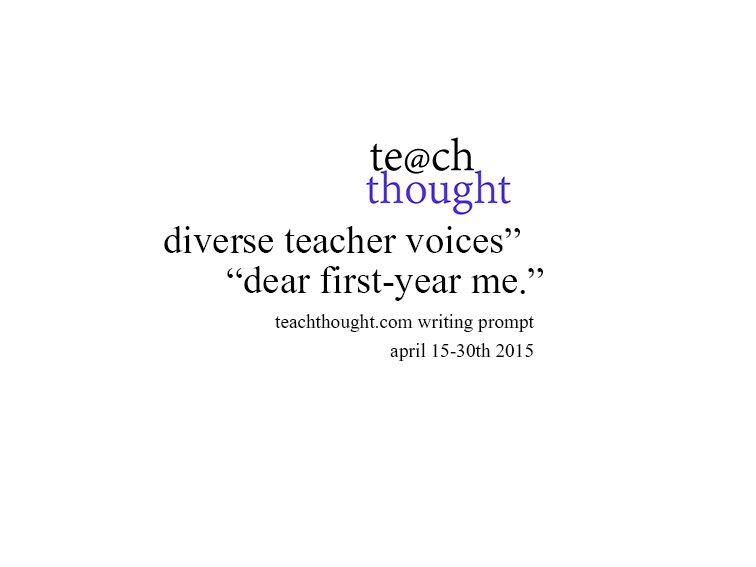 Introducing The TeachThought ‘Diverse Teacher Voices‘ Program
Introducing The TeachThought ‘Diverse Teacher Voices‘ Program
by TeachThought Staff
The ‘Diverse Teacher Voices’ Program is something we think has a chance to be pretty awesome, if we can just convince teachers to take ownership of it and go.
The goal of this (experimental, let’s-see-how-it-goes) program is to help diverse teacher voices share their ideas, experience, affection, and innovative practices for the benefit of everyone. For now, this will be primarily about sharing ideas through writing. The future? We’ve got some ideas for a more robust process, but we want to see how the writing part goes first.
So, some information.
We’re actively seeking diverse voices and perspectives.
The second big idea here, above and beyond innovation-through-sharing, is diversity.
In pursuit, we’re officially encouraging every color, gender, ethnicity, faith, culture, sexual preference, cognitive bias, and pedagogically-principled kind of educator to not simply participate, but to write about education through those unique lenses if you feel it adds value to the global conversation around pedagogy, mobile learning, and the “new normal” of 21st century education.
Without this critical piece, the program is just teachers blogging. The majority of voices in the education space are the same as they’ve ever been–and we’ll all continue to benefit from their expertise. What we’re looking for is a new generation of teachers, thinkers, and innovators to not only be heard, but to create change.
The TeachThought Ethos still applies.
While we’re interested in diverse thinking, anything published must be compelling or useful for modern educators interested in a progressive classroom and curriculum, or replacing the idea of schools and classrooms and curriculum altogether. Within that range is the niche TeachThought tries to occupy.
Our focus on students over institutions, thought over content, inquiry over delivery, models and frameworks over “tips,” (though we do those sometimes, too) and paradigm-shifting integration of education technology over “edtech” is important, but we’re more than willing to publish anything that pushes the global conversation around learning forward. You can write about how to more efficiently use calculators to better prepare students for timed testing and ultimate “career success,” but that thinking is likely to find little traction here.
Think less about what classrooms do look like, and more about what they could look like.
You don’t have to be a “writer.”
This is education–and blogging at that–not Grapes of Wrath. If you’re a teacher, your “blogging literacy” is likely more than sufficient to get you through here. If you can string together complete sentences, you can write. (We let Terry Heick write, don’t we?)
The real question is whether or not you’ve got something worth saying. What you say–fresh voice, new thinking, exciting ideas, etc.–is more important than your diction, syntax, and idea organization.
So, for the first “assignment” (or “growth opportunity”)?
April 15-April 30 prompt:
If you’ve taught more than 3 years (which seem to be most of you), use the following prompt:
Dear First-Year Me…(as in, “Here’s What You’re Going To Need To Know”)
If you’ve taught fewer than 3 years, use the following prompt:
Dear 10th-Year Me…(as in, “Here’s what I hope to have seen/done/learned/accomplished by year 10)
The Other Details
1. As stated above, the big idea of this program is to help a diverse set of voices and perspectives share their ideas, experience, affection, and innovative practices for the benefit of everyone.
2. For now, there will be two prompts per month. (We may do weekly prompts, or we may do monthly or even quarterly.)
3. While we encourage you to push yourself and write “outside of your comfort zone,” don’t write outside of your expertise area. If you don’t have any thinking, ideas, experience, or strategies for a prompt, skip it.
4. Not all blog posts can be published–well, it depends on how many we get, but it’s likely that we won’t be able to publish everything. But who knows? Point is, no guarantees what you write will become a featured post and will win you eternal glory across the interwebs.
5. To apply, email all entries to us directly, or share as a Google Doc. To be considered, please include:
- Your full name (required)
- Years of experience (voluntary)
- Grade level and content area (voluntary)
- School name (voluntary)
- Your twitter username or your personal blog url so we can share with the post (voluntary)
6. These posts are considered guest blogs by teachers. They are not paid opportunities or contracted assignments.
7. Don’t use any “real names” of other teachers, students, etc.
8. Images, diagrams, photos of student work, or any other supporting visual are encouraged by not necessary. Any images with students in it must have signed releases from those students (which makes them a pain, but legal is legal). Also, you must own the rights to any images you contribute. Don’t send any images of student work with student names or other crucial information visible. Anonymity is the rule.
Introducing The TeachThought ‘Diverse Teacher Voices’ Program;
